|
 Secure Site
Secure Site
|
 |
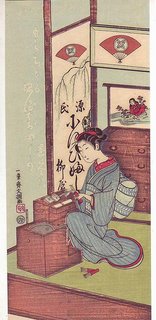 The Zen Alarm Clock transforms mornings, awakening you gradually with a series of gentle acoustic chimes Once you use a Zen Clock nothing else will do Do people choose what would make them happier? Would more money but with less sleep make you happier? A group of economists found that research participants chose what they thought would make them happier 83 percent of the time, with the majority choosing less sleep for a higher salary.
The group from Cornell University and the University of Michigan posed 13 scenarios to 2,699 people, including this question:
Say you have to decide between two new jobs. The jobs are exactly the same in almost every way, but have different work hours and pay different amounts.
Option 1: A job paying $80,000 per year. The hours for this job are reasonable, and you would be able to get about 7.5 hours of sleep on the average work night.
Option 2: A job paying $140,000 per year. However, this job requires you to go to work at unusual hours, and you would only be able to sleep around 6 hours on the average work night.
The paper, first reported by the Washington Post, studied three groups of people: 1,066 patients at a doctor’s waiting room in Denver, 1,000 adults across the country by telephone and 633 Cornell students. The American Economic Review will publish the paper.
Ori Heffetz, a Cornell economics professor who presents the paper at UCLA on Tuesday, said the most surprising finding for him was that “people’s choices seemed to coincide with their happiness predictions least frequently for what they thought were important life decisions.”
Among the respondents in Denver, 58 percent chose option one and also thought more sleep would make them happier, while 29 percent chose option two and said the higher salary would make them happier. However, 12 percent ranked option one (sleep) above option two (income) when asked what would make them happier; but they said they would most likely choose option two. Only one percent said they would choose sleep but thought they’d be happier with income.
Daniel Benjamin, economics professor at Cornell, said one of the most interesting study findings is there are systematic differences between what people think would make them happiest and what they would choose. Many researchers had believed it was obvious that people would choose what they think would make them happiest.
When asked which options they would choose, Heffetz said he would choose the higher salary because he typically needs less than six hours of sleep a night. Benjamin said it was a “tough” question, but he would choose the job that afforded more sleep.
“I don’t think I could survive on 6 hours of sleep at unusual hours,” he wrote in an email. “I need at least 8, preferably more.”
 Wake up with gradual, beautiful acoustic chimes. The Zen Alarm Clock transforms your mornings and gets you started right, with a progressive awakening Wake up refreshed, love your alarm clock, transform your mornings with The Zen Alarm Clock’s progressive awakening with gentle chimes.
The Digital Zen Clock’s long-resonating Tibetan bell-like chime makes waking up a beautiful experience – its progressive chimes begin your day with grace. When the clock’s alarm is triggered, the acoustic chime bar is struck just once … 3-1/2 minutes later it strikes again … chime strikes become more frequent over 10 minutes … eventually striking every 5 seconds until shut off. As they become more frequent, the gentle chimes will always wake you up – your body really doesn’t need to be awakened harshly, with a Zen Clock you’re awakened more gradually and thus more naturally. Unlike artificial recorded sounds coming out of a tiny speaker in a plastic box, natural acoustic sounds transform your bedroom or office environment.
adapted from abcnews.go.com by Suzanna Kim
 The Zen Alarm Clock transforms mornings, awakening you gradually with a series of gentle acoustic chimes Once you use a Zen Clock nothing else will do Now & Zen – The Soothing Alarm Clock Store
1638 Pearl Street
Boulder, CO 80302
(800) 779-6383
orders@now-zen.com
Posted in Bamboo Chime Clocks, Now & Zen Alarm Clocks, sleep, Sleep Habits
 Meditation - Utamaro Woman I have always been intrigued by the idea of meditation. I would love to be able to sit quietly, relax and let my mind wander into a trancelike rest, all at the same time.
There are reported medical benefits to regular meditation too: you can bring down your heart rate and blood pressure. Meditation has been shown to help insomniacs sleep, nervous Nellies relax and those withchronic pain breathe more easily.
Meditation sounds like a perfect dream, actually, but who has time for that? As a television producer, I would say my daily list of things to do can run longer than a pilgrimage to the Ganges. Would it be worth adding meditation to my to-do list? I needed to be convinced.
So I went to Avery Fisher Hall in Manhattan for a group meditation led by Sri Sri Ravi Shankar, a spiritual leader and founder of The Art of Living Foundation. “The Guru,” as he is called, traveled from southern India to kick off the “I Meditate NY” campaign, designed to introduce stressed-out New Yorkers to the powers of the ancient practice of meditation. Gathered in the hall normally reserved for plays and operas were nearly 2,700 people ready to follow the spiritual teachings of the master on stage.
The preparation began with ancient Sanskrit chants from the folk group Bakti and soulful vocals from the Grammy-nominated singer Chandrika Tandon. But before long The Guru took center stage, sitting in the lotus position on a regal loveseat.
With a creeping smile on his face, he began to explain the three platinum rules of meditation. The first, he said, was to say to oneself, “For the next 10 minutes, I want nothing.” Sounded simple enough, but the truth is I did want something. I was a little hungry, even though I had a pretty big cheeseburger a few hours earlier. It even had all sorts of extras on it. My mind started to wander: Why was I hungry when I just had a big meal? Maybe it wasn’t as big as I thought? Oh man, that means that cheeseburger must have clearly been full of empty calories.
But The Guru had already moved on to platinum rule number two: “For the next 10 minutes, I do nothing.” Just then, my foot started to itch. I reached down to scratch it immediately, figuring the clock hadn’t yet started.
Rule three: “For the next ten minutes, I am nothing.” Now he was on to something. I liked that idea. It made me feel as if I had permission to float away, let my spirit drift into oblivion, all the while surrounded by thousands of people.
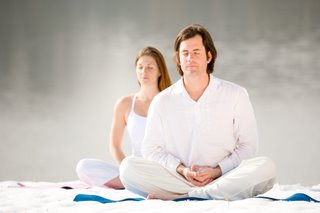 Meditation - Choose a Gong Meditation Timer Sounds of Silence
The group was full of Om’s and ready to sink into silence… or so we thought. Just then, The Guru reached into the pocket of his caftan for hiscellphone. The crowd burst into laughter — no doubt, this was a 21st-century guru. He promised it was only to time our imminent meditation, which he has said would last about 10 minutes.
Now we were on our way. He asked everyone to keep still and be quiet. If you didn’t think you could do so, it was now time for you to leave. He said nobody should leave in the middle of the journey, as that would not be fair to others around them. Parents with children were asked to leave now. It was time to begin.
The room fell silent, but not silent enough. There were coughs, bodily noises, feet sliding, and yes, a cell phone. I thought, it’s going to be tough to concentrate on doing nothing. The coughs seemed ceaseless. I wondered, well, we are heading into allergy season, is that why there are so many coughs? Or is this just how people always are? It isn’t often I’m in a room with 2,700 people.
But then something happened. I don’t really know what happened, because it’s as if I wasn’t there when it occurred. I mean, I was there, but I was nothing more than just there. Sitting. Breathing. Not hearing coughs. Not hearing feet shuffling. Not even hearing silence. I was awake. I was conscious. It wasn’t that hard. I was peaceful. I was meditating.
There we were. An auditorium full of silent people, together, effortless, releasing our minds from daily stress, buried in peace, meditating.
Meditation: Struggling to Do Nothing
And then it was over. The Guru woke us up — and then he gave us a jolt. He told us in his gentle meandering voice that we had been in this “amusement paradise” for 22 minutes. Not 10 minutes as he had suggested, but more than double that. The entire room gasped. We had disappeared for nearly the length of an evening news broadcast.
And, even though it felt counterintuitive to do something so seemingly solitary with so many others, it actually now made perfect sense. Later, The Guru told me, “Group meditations help in creating a positive energy in the atmosphere.” Meditation was all about vibrations, he said. Just as we “catch anger” from angry people around us, we “catch” positive energy from positive people around us. The room was surely full of positivity.
 meditation timers with gongs So there you have it. A frazzled New Yorker with a Ganges-long list of to-dos may have just peacefully and willingly made her list longer.
Use our unique “Zen Clock” which functions as a Yoga & Meditation Timer. It features a long-resonating acoustic chime that brings your meditation or yoga session to a gradual close, preserving the environment of stillness while also acting as an effective time signal. Our Yoga Timer & Clock can be programmed to chime at the end of the meditation or yoga session or periodically throughout the session as a kind of sonic yantra. The beauty and functionality of the Zen Clock/Timer makes it a meditation tool that can actually help you “make time” for meditation in your life. Bring yourself back to balance.
It’s exquisite sounds summon your consciousness out of your meditative state with a series of subtle gongs. Once you experience the Zen Timepiece’s progressive tones, you’ll never want to meditate any other way. It serves as the perfect meditation timer. Available in 5 wood styles, including bamboo.
adapted from WorldNewsReport.com by Gitka Ahuja
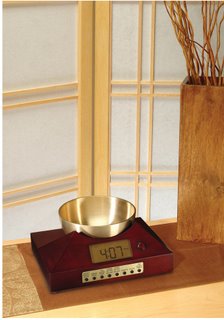 Gong Meditation Timers for Your Stillness Practice Now & Zen – The Gong Meditation Timer Store
1638 Pearl Street
Boulder, CO 80302
(800) 779-6383
Posted in Well-being, Yoga Timer, Yoga Timers by Now & Zen, Zen Alarm Clock, Zen Timepiece by Now & Zen, Zen Timers
 Wake Up Slowly and Naturally with Zen Clocks - Kitagawa Utamaro A new poll on sleep habits suggests that millions of Americans are in a bad mood, short-tempered and prone to overeat because they are tired.
The National Sleep Foundation Poll, released today, finds that people say they’re much or somewhat more likely to make mistakes, get impatient or aggravated when waiting, or get upset with their children or others when they haven’t gotten enough sleep.
One fourth said they were more likely to eat more than usual on days when they didn’t get enough sleep, with slightly more women than men reporting this was common.
The poll establishes a link between how Americans sleep and “their overall behavior, mood and performance,” said Richard Gelula, the foundation’s executive director. “It shows ‘you are how you sleep.’ And it indicates that some of the problems that we face as a society, from road rage to obesity, may be linked to lack of sleep or poor sleep.”
The foundation, an independent, nonprofit organization researches sleep problems. It has conducted a poll on sleep habits each year since 1998, part of a springtime sleep-awareness campaign tied to the return of daylight- savings time, which begins Sunday.
The poll of 1,010 adults, taken between October and early December, found that nearly a quarter felt they weren’t getting the minimum amount of sleep they need to be alert the next day. Thirty-seven percent said they are so sleepy during the day that it interferes with their activities a few days each month; 16 percent said they experience this level of fatigue at least a few days a week.
Overall, sleep habits have remained fairly steady since the poll began, but the number of people reporting they sleep less than six hours a night both on weekdays and weekends rose slightly last fall, to 15 percent and 10 percent, respectively. On average, people say they are sleeping an average of 6.9 hours on weeknights and 7.5 hours on weekends.
Adults living in the West were more likely to get eight hours or more sleep on a workday than those living in the Midwest, South and Northeast.
 Once you experience the Zen Timepiece's progressive awakening, you'll never want to wake up any other way. Those who got fewer than six hours of sleep on weekdays were twice as likely to describe themselves as stressed or sad.
And people who reported often being sleepy during the day were considerably more likely than those who were never or rarely sleepy to describe themselves as dissatisfied with life (21 percent versus 7 percent) or angry (12 percent versus 4 percent).
More than half of those surveyed said they experience symptoms of insomnia a few nights a week or more; 37 percent said they snore frequently and 1 in 10 experiences pauses in breathing while sleeping.
The luxurious awakening provided by the Zen Alarm Clock is part of the growing preference for things natural—natural foods, natural fibers, and now, natural acoustic sounds. Like organic tomatoes in your salad, the organic sounds of the Zen Alarm Clock’s sweet acoustic chimes are truly a gourmet experience.
What makes this gentle awakening experience so exquisite is the sound of the natural acoustic chime, which has been tuned to produce the same tones as the tuning forks used by musical therapists. According to the product’s inventor, Steve McIntosh, “once you experience this way of being gradually awakened with beautiful acoustic tones, no other alarm clock will ever do.”
adapted from sfgate.com by Lee Bowman, Scripps Howard News Service
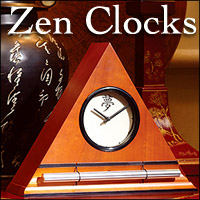 Why be Startled Awake -- Choose the Gentle Chime Alarm Clock for a Progressive Awakening Now & Zen – The Gentle Chime Alarm Clock Shop
1638 Pearl Street
Boulder, CO 80302
(800) 779-6383
Orders@now-zen.com
Posted in Bamboo Chime Clocks, Insomnia, sleep, Sleep Habits
 Once you experience the Zen Timepiece's progressive tones, you'll never want to meditate any other way. Meditation’s virtues have long been praised and, more recently, documented in studies on Buddhist monks, who devote their entire lives to the discipline. But how effective can it really be for Western meditators, who practice on average just 30-40 minutes a day while balancing an entirely different set of external responsibilities and social stresses than their more rigid Eastern counterparts?
A team of researchers from Yale, Harvard, Massachusetts General Hospital, and the Massachusetts Institute of Technology recently checked it out. Using magnetic resonance imaging (MRI), the scientists scanned the brains of 35 test participants; 20 Western-style meditators and 15 control participants who had never practiced meditation or yoga. The former group was instructed to meditate, while the latter was asked to relax and let their minds wander.
The result? Brain regions associated with attention and sensory processing were denser in meditators (up to 4 to 8 thousandths of an inch thicker) than those of the control group. Moreover, the study demonstrated that regular meditation could reduce the effects of normal cognitive aging and perhaps even memory loss. “This was the first time anyone has looked at brain structure in meditation subjects”, said lead researcher Sara Lazar, Ph.D., a psychologist at Harvard Medical School. “Consistent with the reports of meditators, who claim that meditation affects all aspects of their lives, our findings suggest that cortical plasticity (structural changes of the brain) are not just limited to the amount of time spent actually sitting and meditating.”
You don’t have to shave your head and hole yourself up in an ashram; even a half-hour of meditation delivers lasting mind-body health benefits.
 Bring yourself back to balance. Use our unique “Zen Clock” which functions as a Yoga Timer. It features a long-resonating acoustic chime that brings your meditation or yoga session to a gradual close, preserving the environment of stillness while also acting as an effective time signal. Our Yoga Timer & Clock can be programmed to chime at the end of the meditation or yoga session or periodically throughout the session as a kind of sonic yantra. The beauty and functionality of the Zen Clock/Timer makes it a meditation tool that can actually help you “make time” for meditation in your life. Bring yourself back to balance.
adapted from healinglifestyles.com by Lindsay Morris
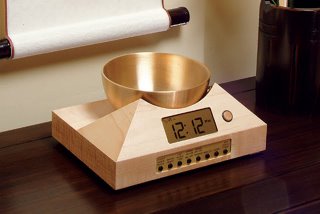 Once you experience the Zen Timepiece's progressive tones, you'll never want to meditate any other way. It serves as the perfect meditation timer. Now & Zen – The Meditation Timer Store
1638 Pearl Street
Boulder, CO 80302
(800) 779-6383
orders@now-zen.com
Posted in Meditation Timers, Meditation Tools, mindfulness practice
 Use our unique "Zen Clock" which functions as a Yoga Timer. It features a long-resonating acoustic chime that brings your meditation or yoga session to a gradual close, preserving the environment of stillness while also acting as an effective time signal. Positive brain changes take hold after just 11 hours of practicing a form of meditation, the results of a new study suggest.
The study included 45 University of Oregon students who were randomly selected to be in either a study group that did integrative body-mind training (IBMT) or a control group that did relaxation training. IBMT was adapted from traditional Chinese medicine in the 1990s.
A comparison of scans taken of the students’ brains before and after the training showed that those in the IBMT group had increased brain connectivity. The changes were strongest in connections involving the anterior cingulate, an area that plays a role in the regulation of emotions and behavior, Yi-Yuan Tang of Dalian University of Technology in China, University of Oregon psychologist Michael I. Posner, and colleagues found.
The boost in brain connectivity began after six hours of IBMT and became more apparent after 11 hours of practice, according to the report published in the Aug. 16-21 online edition of the Proceedings of the National Academy of Sciences.
The meditation-induced changes may be due to a reorganization of white-matter tracts or due to an increase of myelin that surrounds the brain connections, the study authors suggested.
“The importance of our finding relates to the ability to make structural changes in a brain network related to self-regulation. The pathway that has the largest change due to IBMT is one that previously was shown to relate to individual differences in the person’s ability to regulate conflict,” Posner said in a university news release.
SOURCE: University of Oregon, news release, Aug. 16, 2010
 The beauty and functionality of the Zen Clock/Timer makes it a meditation tool that can actually help you "make time" for meditation in your life. Although meditation can be done in almost any context, practitioners usually employ a quiet, tranquil space, a meditation cushion or bench, and some kind of timing device to time the meditation session. Ideally, the more these accoutrements can be integrated the better. Thus, it is conducive to a satisfying meditation practice to have a timer or clock that is tranquil and beautiful. Using a kitchen timer or beeper watch is less than ideal.
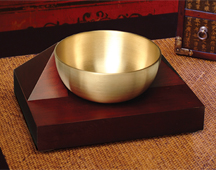 Our Yoga Timer & Clock can be programmed to chime at the end of the meditation or yoga session or periodically throughout the session as a kind of sonic yantra.
And it was with these considerations in mind that we designed our Zen Alarm Clock and practice timer. This unique “Zen Clock” features a long-resonating acoustic chime that brings the meditation session to a gradual close, preserving the environment of stillness while also acting as an effective time signal. The Zen Clock can be programmed to chime at the end of the meditation session or periodically throughout the session as a kind of sonic yantra. The beauty and functionality of the Zen Clock/Timer makes it a meditation tool that can actually help you “make time” for meditation in your life.
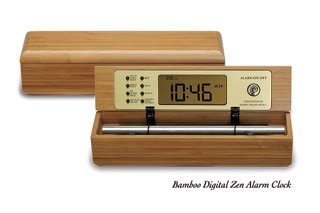 When you hear the sound of the mindfulness bell, you are invited to take a moment to breathe in and out and center yourself in the present.
Posted in Bamboo Chime Clocks
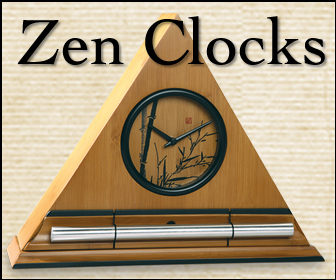 meditation timers for cultivating calm How to Cultivate Calm
It may seem counterintuitive, but one of the best things you can do in times of high stress is not much at all. Of course, what you’re thinking about during this quiet period of reflection and breathing makes a big difference. By practicing meditation and mindful breathing, you can reduce stress levels, increase productivity, and boost your mood.
Meditation doesn’t necessarily mean sitting cross-legged on a pillow or lying on the ground. In fact, you can do the following exercises indoors or outdoors, at work or in your car, with a free hour or a free minute. You don’t have to perfect them all, but experimenting with various techniques will help you find the method that works best for you.
wholeliving.com, Dec. 2011
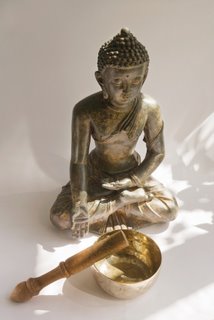 Carved Wooden Thai Buddha with Singing Bowl Now & Zen
1638 Pearl Street
Boulder, CO 80302
(800) 779-6383
Posted in Chime Alarm Clocks
 The Zen Alarm Clock transforms mornings, awakening you gradually with a series of gentle acoustic chimes Once you use a Zen Clock nothing else will do Anyone who’s ever experienced a fitful night of sleep knows that “just relax” is easier said than done. But do-it-yourself meditation practices may help you prepare for rest, and put worries or discomfort behind you.
These techniques work best when done right before bed, in a quiet, calming environment. But you can also practice them several times a day, recommends Joyce Walsleben, PhD, associate professor at New York University School of Medicine.
“If you can keep your stress levels under control during the day, you’ll sleep better at night,” Walsleben says. “You can even do them at your desk or on the train.”
Abdominal breathing
Breathing from the abdomen and putting your attention on those breaths can help you relax both during the day and in bed at night. Some people may enjoy lying in a dimly lit room, closing their eyes, or listening to soft music while focusing on their out breaths.
While sitting or lying in bed, try placing your hands on your belly. “When you breathe in and breathe out, your hands may gently move,” says Kathy Doner, MD, who has a full-time hypnotherapy practice in Sebastian, Fla. “Focusing on this movement gets your mind off of your busy thoughts and onto your body. You can distract yourself and bring yourself to a different place. It’s very calming.”
Guided imagery
Some people imagine a calm scene to help them wind down at the end of the day. There are no rules about what you should imagine, so long as it’s calming. Although clouds, the ocean, and mountains are common choices, you can focus on something as general or as specific as you want.
“I had a patient who liked to picture his office—brushing everything off his desk and going to sleep,” Walsleben says. “Other people enjoy visualizing that they’re blowing bubbles. They put the stick in the jar and watch every bubble go over a field until the jar is empty.”
Pick a place that feels safe, and, using your imagination, invite any or all of your senses to explore it. “The brain doesn’t always know the difference between pretend and real,” says Dr. Doner. “If you watch a scary movie, your adrenaline might go up, just as if you imagine eating something vividly enough, you might start to salivate.”
Guided imagery can be done alone or with a specialist, such as a sleep doctor, cognitive-behavioral therapist, or hypnotherapist, or by using a tape or CD—but even when prompted by an instructor, the patient should still be the guide. “They need to imagine someplace comfortable and peaceful,” says Dr. Doner. “I don’t know where they need to go; the ocean may seem peaceful for one person, but traumatic for another.”
 Waking up in the morning should be as pleasant as falling asleep at night. The Zen Alarm Clock's gradual, gentle awakening is transformative. Mindful meditation
Focusing on different aspects of your life before bed can help you earn your rest, if you’re able to let those thoughts go. “You need to look at one thing at a time, which slows things down,” says Walsleben. “Focus on an issue in your life, then let it go. The major learning experience here is letting go.”
For some people, it may help to write in a journal during the day. “For 15 minutes take those issues that run through your head at night and write them down,” says Walsleben. “Then for the next 15 minutes make a plan and write that down too. At night when the lights are off, you can’t do anything about it, but by processing things in the daytime, you can.”
Counting down
While lying in bed, start by gazing upward. “A little eye strain relaxes you,” says Dr. Doner. Take an abdominal breath and hold it, and on the out breath, let everything relax. Repeat one or two times. You might then try imagining yourself walking down a flight of stairs or a gentle hill while counting down from 10 or 20, each number signifying your movement to a lower step, exhaling with each imaginary step.
You can also weave a number of these techniques together, Dr. Doner says. “You might start with your belly breath,” she says, “then go to progressive relaxation, then down the stairs, then go to your peaceful place. You want to give people a lot of things to try.”
One of the ultimate Zen like experiences is waking-up from a great slumber refreshed and energized. Your mind and body are harmoniously one, both alert and focused. Having a refreshed mind and body are two keys to a natural and Zen lifestyle. Waking up in the morning should not be a loud and abrupt awakening, but rather it should be a peaceful positive experience. The right natural alarm clock can transition your deep and tranquil sleep into a serene start to consciousness. Imagine a long-resonating Tibetan bell-like chime waking you up to a beautiful morning experience.
The right alarm clock can be the most beneficial investment for you. With our Now & Zen natural alarm clock you are awakened more gradually and thus more naturally. Now & Zen is focused on creating a naturalistic lifestyle, and our clocks are an example of our philosophy.
adapted fro Health.com
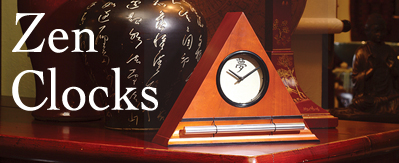 Wake up refreshed, love your alarm clock, transform your mornings with The Zen Alarm Clock's progressive awakening with gentle chimes. Now & Zen – The Meditation Timer Shop
1638 Pearl Street
Boulder, CO 80302
(800) 779-6383
orders@now-zen.com
Posted in Bamboo Chime Clocks
 Use our unique "Zen Clock" which functions as a Yoga Timer. It features a long-resonating acoustic chime that brings your meditation or yoga session to a gradual close, preserving the environment of stillness while also acting as an effective time signal. Following up on previous research showing that people who have practiced meditation for a long time have more gray matter in their brains, a small new study finds that their brains also shrink less as they age and they have stronger connections in the brain itself.
This means that brain cells may better relay electrical signals, researchers said.
“Our results suggest that long-term meditators have white-matter fibers that are either more numerous, more dense or more insulated throughout the brain,” study co-author Eileen Luders, a visiting assistant professor at the University of California Los Angeles Laboratory of Neuro Imaging, said in a university news release.
“We also found that the normal age-related decline of white-matter tissue is considerably reduced in active meditation practitioners,” she added.
 The beauty and functionality of the Zen Clock/Timer makes it a meditation tool that can actually help you "make time" for meditation in your life. Bring yourself back to balance. The researchers used technology known as diffusion tensor imaging to scan the brains of study participants and uncover differences in structural connectivity. The study included 27 people who practiced meditation styles such as Shamatha, Vipassana and Zazen for between 5 to 46 years, and 27 other people of the same age and gender who did not meditate.
The investigators found that the two groups had pronounced differences in structural connectivity throughout the brain, not just in one area.
“Meditation . . . might not only cause changes in brain anatomy by inducing growth, but also by preventing reduction,” Luders said. “That is, if practiced regularly and over years, meditation may slow down aging-related brain atrophy, perhaps by positively affecting the immune system.”
However, “it’s possible that meditators might have brains that are fundamentally different to begin with,” Luders pointed out.
“For example, a particular brain anatomy may have drawn an individual to meditation or helped maintain an ongoing practice — meaning that the enhanced fiber connectivity in meditators constitutes a predisposition towards meditation, rather than being the consequence of the practice,” Luders said.
The study findings were released online in advance of publication in the Aug. 15 print edition of the journal NeuroImage.
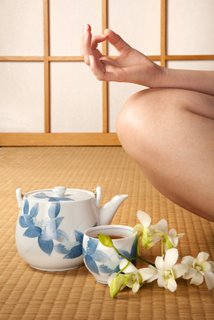 Use our unique "Zen Clock" which functions as a Yoga Timer. It features a long-resonating acoustic chime that brings your meditation or yoga session to a gradual close, preserving the environment of stillness while also acting as an effective time signal.
Although meditation can be done in almost any context, practitioners usually employ a quiet, tranquil space, a meditation cushion or bench, and some kind of timing device to time the meditation session. Ideally, the more these accoutrements can be integrated the better. Thus, it is conducive to a satisfying meditation practice to have a timer or clock that is tranquil and beautiful. Using a kitchen timer or beeper watch is less than ideal.
And it was with these considerations in mind that we designed our digital Zen Alarm Clock and practice timer. This unique “Zen Clock” features a long-resonating acoustic chime that brings the meditation session to a gradual close, preserving the environment of stillness while also acting as an effective time signal. The Digital Zen Clock can be programmed to chime at the end of the meditation session or periodically throughout the session as a kind of sonic yantra. The beauty and functionality of the Zen Clock/Timer makes it a meditation tool that can actually help you “make time” for meditation in your life.
More information
The U.S. National Center for Complementary and Alternative Medicine has more about meditation.
– Randy Dotinga
SOURCE: University of California, Los Angeles Health Sciences, news release, July 14, 2011
 Our Yoga Timer & Clock can be programmed to chime at the end of the meditation or yoga session or periodically throughout the session as a kind of sonic yantra. Now & Zen – The Meditation Timer Shop
1638 Pearl Street
Boulder, CO 80302
(800) 779-6383
orders@now-zen.com
Posted in Bamboo Chime Clocks
 Can an alarm clock be bad for your health? According to Research by the National Institute of Industrial Health in Japan, despite the popularity of using an alarm clock, waking up to a jolting noise can be bad for your heart. Waking up abruptly can cause higher blood pressure and heart rate. Besides increasing your blood pressure, an alarm can add to your stress levels by getting your adrenaline rushing.
The solution to this health-harming problem is to instead try gradually waking up to natural light or to The Zen Alarm Clock which has soothing chime sounds. It may not be simple, but this replacement method sounds better than shrills from your alarm clock.
One of the ultimate Zen like experiences is waking-up from a great slumber refreshed and energized. Your mind and body are harmoniously one, both alert and focused. Having a refreshed mind and body are two keys to a natural and Zen lifestyle. Waking up in the morning should not be a loud and abrupt awakening, but rather it should be a peaceful positive experience. The right natural alarm clock can transition your deep and tranquil sleep into a serene start to consciousness. Imagine a long-resonating Tibetan bell-like chime waking you up to a beautiful morning experience.
The right alarm clock can be the most beneficial investment for you. With our Now & Zen natural alarm clock you are awakened more gradually and thus more naturally. Now & Zen is focused on creating a naturalistic lifestyle, and our clocks are an example of our philosophy.
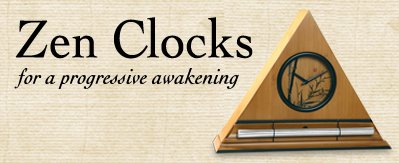 The Zen Alarm Clock transforms mornings, awakening you gradually with a series of gentle acoustic chimes Once you use a Zen Clock nothing else will do Now & Zen – The Soothing Alarm Clock Store
 The Calming Alarm Clock Store - Boulder, CO 1638 Pearl Street
Boulder, CO 80302
(800) 779-6383
orders@now-zen.com
Posted in Bamboo Chime Clocks, sleep, Sleep Habits
 Being Kept Awake - What to Do? Ukiyoe Hokusai It’s annoying enough to be kept awake by a music-blaring neighbor, but when it’s you who is sabotaging your own opportunity for rest, it really makes a girl want to scream…and cry from exhaustion.
Stress-induced insomnia is rampant these days among 20- and 30-something women. Thanks to job and money craziness, hectic social schedules, and the pressure to be totally together, the typical chick is more tense than ever, and that means she’s getting less sleep than her body needs, explains Joyce Walsleben, PhD, associate professor of medicine at the New York University School of Medicine and coauthor of A Woman’s Guide to Sleep.
Here, we explain how stress messes with your nocturnal schedule. Plus, we give tips to help you quiet your reeling brain and racing heart so you can get the R & R you need.
How Chronic Stress Screws Up Your System
It should be simple: You are tired and it’s bedtime, so you drift away within minutes of putting head to pillow. But when you’re stressed, things go haywire, and the exact opposite happens instead. Being even a little anxious can make your muscles tense, prompt your body to release the stress hormones cortisol and adrenaline, and elevate your heart rate.
You can feel these effects when you’re worried during the day. But at night, they have a stronger impact, overriding your ability to sleep or preventing you from staying asleep so you wake in the middle of the night, says Thomas Roth, PhD, director of the sleep center at the Henry Ford Hospital, in Detroit. Even if you do manage to snooze, stress will make the rest you get more fitful. Plus, you’ll spend more time in the lighter stages of sleep rather than in deeper slow-wave and REM sleep, which leaves you vulnerable to waking in the middle of the night, explains Barry Krakow, MD, medical director of the Maimonides Sleep Arts and Sciences, in Albuquerque, New Mexico, and author of Sound Sleep, Sound Mind.
Why Women Have It Rougher
Hormonal shifts may make a woman more susceptible to anxiety during certain points in her cycle, such as during her preperiod week. But insomnia is also caused by the way so many chicks run their lives: cramming a ton of tasks and responsibilities into their schedules and not saying no to bosses, friends, and family members who ask them to take on more, says Walsleben.
When you’re juggling a zillion things all day, it’s almost impossible to chill out at night — especially since the time you’re waiting to fall asleep may be one of the only free moments during which you can contemplate your life. If you’re stressed, thoughts and worries will flood your mind, triggering physiological changes incompatible with drifting off.
 Wake up with gradual, beautiful acoustic chimes. The Zen Alarm Clock transforms your mornings and gets you started right, with a progressive awakening The Snowball Effect
If stress kept you up only once every so often, it wouldn’t be that big of a deal. Unfortunately, it’s the snowball effect that makes the stress-sleeplessness trap so pernicious. “It’s called psychophysiologic insomnia,” says Walsleben. “After worrying about how you got no sleep the night before, you get into bed early the next night, worried that it’ll happen again. But this panic produces brain activity that makes it even harder to sleep, and the cycle continues for days, even weeks.”
Besides leaving you tired and cranky, insomnia also decreases your immunity, makes you forgetful, and can even lower your metabolism so you pack on pounds. It’s a health issue that affects your entire body, Walsleben adds. Beating the Stress/No-Sleep Cycle
Getting a handle on this kind of insomnia means learning how to reduce your stress levels during the day and keeping yourself from wigging out at night. These anxiety reducers will help.
Unplug yourself. Always being hooked up to your cell and social- networking sites boosts anxiety because you’re constantly anticipating the next call, text, or message. “Turning off your gadgets for an hour or two before you hit the sheets gives your brain time to turn off as well,” explains Allen Elkin, PhD, director of the Stress Management and Counseling Center, in New York City, and author ofStress Management for Dummies.
Take a nap. It sounds counterproductive, but a 30-minute nap will lower levels of cortisol, so you’ll wake up feeling less anxious. Try to nap before 2 p.m., when it’s less likely to cut into your regular sleep hours.
Write a been-done list. Instead of a to-do list, jot down everything you’ve accomplished at the end of the day, even small tasks. Seeing the list in writing will remind you that your life is less frazzled and out of control than you think it is, and that’ll help you chill.
Set a daytime worry slot. Late in the afternoon, take 20 minutes to think about only whatever it is that’s making you nervous at the moment. “Worries are never as bad in the day as they are at night, so you’re more likely to put things in perspective and come up with a plan of action,” says Walsleben.
Sink into sleep. While you’re lying there, obsessing over whether sleep will ever come, ease your nervous system with this trick: Imagine the muscles in your feet relaxing and melting into your mattress. Picture the same scenario with your calves, then your thighs, until you have worked your way up your entire body. In addition to relaxing your muscles, it’s a visualization tactic that calms your brain as well.
Take advantage of being up at night. Instead of freaking out about how tired you are going to be in the morning, treat your being awake at 2 a.m. as a lucky break, giving you time to enjoy soothing activities like reading. By viewing insomnia as a positive thing, you’ll have nothing to stress about, and paradoxically, you will likely have trouble keeping your eyes open much longer.Sleep Tricks
Below, little tactics that bring on the zzz’s and some that backfire.
What Works
Taking a hot bath before bed. Besides being relaxing in its own right, the steamy water also raises your core body temperature, and the subsequent drop in body temperature after you leave the tub puts you in hibernation mode.
Sipping a cup of warm milk. The warmth is comforting, but it’s really the milk that has a soporific effect. Milk contains tryptophan, an amino acid that is converted into serotonin — a body chemical in the brain that makes you drowsy.
Playing quiet, soothing music. Folk, classical, and even lite-FM tunes that maintain a steady pitch and rhythm have a lulling effect on your system.
What’s Bunk
Exercising close to bedtime. Working out prompts the release of adrenaline and endorphins, hormones that keep you awake. Better to hit the gym at least three to four hours before you go to sleep so you give your body time to cool down and the hormone rush time to subside.
Having a drink. Alcohol can make you sleepy initially, but it will likely wake you up later as your body metabolizes the booze.
Snacking late at night. It varies depending on the type of food, but in most cases, eating will just pep you up. Even a rich, heavy snack that leaves you feeling woozy at first may cause you to wake in the middle of the night as your body digests the fat.
Wake up refreshed, love your alarm clock, transform your mornings with The Zen Alarm Clock’s progressive awakening with gentle chimes.
Boulder, Colorado—an innovative company has taken one of life’s most unpleasant experiences (being startled awake by your alarm clock early Monday morning), and transformed it into something to actually look forward to. “The Zen Alarm Clock,” uses soothing acoustic chimes that awaken users gently and gradually, making waking up a real pleasure.
Rather than an artificial recorded sound played through a speaker, the Zen Clock features an alloy chime bar similar to a wind chime. When the clock’s alarm is triggered, its chime produces a long-resonating, beautiful acoustic tone reminiscent of a temple gong. Then, as the ring tone gradually fades away, the clock remains silent until it automatically strikes again three minutes later. The frequency of the chime strikes gradually increase over ten-minutes, eventually striking every five seconds, so they are guaranteed to wake up even the heaviest sleeper. This gentle, ten-minute “progressive awakening” leaves users feeling less groggy, and even helps with dream recall.
Source: Registered nurse Joyce Walsleben, PhD
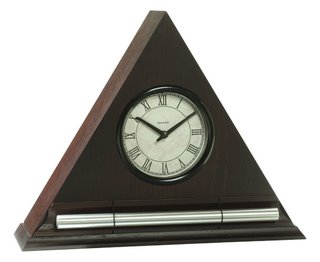 Progressive Chime Awakening - Choose the Most Natural Way to Wake Up Now & Zen – ‘The Most Natural Way to Wake Up’ Clock Shop
1638 Pearl Street
Boulder, CO 80302
(800) 779-6383
orders@now-zen.com
Posted in Bamboo Chime Clocks, sleep, Sleep Habits, zen, Zen Alarm Clock
|
|
|
|